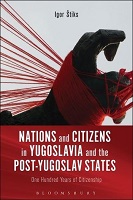Chapter 10 Partners Again? The European Union and the Post-Yugoslav Citizens
| dc.contributor.author | Štiks, Igor | |
| dc.date.accessioned | 2018-08-08 11:50:36 | |
| dc.date.accessioned | 2020-04-01T13:09:14Z | |
| dc.date.available | 2020-04-01T13:09:14Z | |
| dc.date.issued | 2015 | |
| dc.identifier | 642980 | |
| dc.identifier | OCN: 1076784480 | en_US |
| dc.identifier.uri | http://library.oapen.org/handle/20.500.12657/30749 | |
| dc.description.abstract | The final chapter brings to the scene the European Union whose influence in shaping the post-Yugoslav citizenship regimes and the lives of their citizens is highly significant. Today the region is divided into the EU members and the potential candidates for membership. When it comes to the EU’s role in influencing, shaping, defining and re-defining the citizenship regimes in the post-Yugoslav region, this chapter shows how diverse the EU’s actions and results are and how often, alongside obvious improvements, they appear problematic, counterproductive or fruitless. The chapter focuses on five major ways whereby the EU itself (mis)manages these citizenship regimes and their citizens: (a) direct intervention and supervision such as in Kosovo, Bosnia and Macedonia; (b) the visa liberalization process in Bosnia, Serbia, Montenegro and Macedonia; (c) the pre-accession influence in Croatia (until 2013), Serbia and Montenegro; (d) the post-accession influence in EU members Croatia (after 2013) and Slovenia, and, finally, (e) the influence exerted by individual EU Member States (Hungary, Greece, Bulgaria and, after 2013, Croatia) on non-EU post-Yugoslav citizenship regimes. The final chapter in the story of one hundred years of citizenship in and after Yugoslavia brings to the scene another powerful player whose influence in shaping the post-Yugoslav citizenship regimes and influencing the lives of their citizens is far from insignificant. The EU has been the most powerful political and economic agent in this region that has effectively divided it into the EU members and the potential candidates for membership. The former Yugoslav space overlaps with the so-called Western Balkans, a changing geopolitical construct forged in Brussels, composed of those former Yugoslav republics that have not joined the EU so far plus Albania. The ‘Western Balkans’ approach as an umbrella term for the countries outside the EU but completely encircled by the EU, though the Schengen border moves much slower, hides the fact that, regardless of the EU membership, Slovenia is still deeply involved with its southern neighbours and Croatia remains one of the most important actors in the former Yugoslav space. One could say that ‘Yugoslavia’ in this respect has disappeared as a political entity but not as a geopolitical space. The EU does not only directly influence its members (Slovenia and Croatia), supervises the Western Balkan candidates – ‘negotiations’ being a euphemism for a one-way communication amounting to the huge translation operation of the acquis communautaire – but it actually maintains there two semi-protectorates (Bosnia and Kosovo). It has developed varied approaches: bilaterally negotiating membership (Croatia before 2013, Serbia, Montenegro and Albania), punishing and rewarding (Serbia, Bosnia, Kosovo and Albania), managing (Bosnia), governing (Kosovo) and, finally, ignoring (Macedonia blocked in the name dispute with Greece). The EU in the Balkans is therefore not only a club that tests its candidates. It is an active player in transforming them, politically, socially and economically. David Chandler concludes that ‘the EU’s discourse of governance enables it to exercise a regulatory power over the 174candidate member states of Southeastern Europe while evading any reflection on the EU’s own management processes, which are depoliticized in the framing of the technocratic or administrative conditions of enlargement’ (2010: 69). If the EU basically builds future or potential member states, then we have to ask how the EU manages both citizenship regimes of the post-Yugoslav states and their citizens. | |
| dc.language | English | |
| dc.subject.classification | thema EDItEUR::J Society and Social Sciences | en_US |
| dc.subject.classification | thema EDItEUR::J Society and Social Sciences::JP Politics and government | en_US |
| dc.subject.other | western balkans | |
| dc.subject.other | european integration | |
| dc.subject.other | citizenship policies | |
| dc.subject.other | european union | |
| dc.subject.other | visa liberalization | |
| dc.subject.other | european citizenship | |
| dc.subject.other | enlargement | |
| dc.subject.other | western balkans | |
| dc.subject.other | european integration | |
| dc.subject.other | citizenship policies | |
| dc.subject.other | european union | |
| dc.subject.other | visa liberalization | |
| dc.subject.other | european citizenship | |
| dc.subject.other | enlargement | |
| dc.subject.other | Croatia | |
| dc.subject.other | Kosovo | |
| dc.subject.other | Member state of the European Union | |
| dc.subject.other | Serbia | |
| dc.subject.other | Slovenia | |
| dc.subject.other | Socialist Federal Republic of Yugoslavia | |
| dc.subject.other | Travel visa | |
| dc.title | Chapter 10 Partners Again? The European Union and the Post-Yugoslav Citizens | |
| dc.type | chapter | |
| oapen.identifier.doi | 10.5040/9781474221559.ch-011 | |
| oapen.relation.isPublishedBy | 066d8288-86e4-4745-ad2c-4fa54a6b9b7b | |
| oapen.relation.isPartOfBook | 652c73a7-2e3d-4da9-8af8-4cde5d8e61a4 | |
| oapen.relation.isFundedBy | FP7 Ideas: European Research Council | |
| oapen.collection | European Research Council (ERC) | |
| oapen.pages | 173-186 | |
| oapen.pages | 13 | |
| oapen.place.publication | London | |
| oapen.chapternumber | 11 | |
| oapen.grant.number | 230239 | |
| oapen.grant.acronym | CITSEE | |
| oapen.grant.program | FP7 | |
| oapen.remark.public | Relevant Wikipedia pages: Balkans - https://en.wikipedia.org/wiki/Balkans; Citizenship of the European Union - https://en.wikipedia.org/wiki/Citizenship_of_the_European_Union; Croatia - https://en.wikipedia.org/wiki/Croatia; European Union - https://en.wikipedia.org/wiki/European_Union; Kosovo - https://en.wikipedia.org/wiki/Kosovo; Member state of the European Union - https://en.wikipedia.org/wiki/Member_state_of_the_European_Union; Serbia - https://en.wikipedia.org/wiki/Serbia; Slovenia - https://en.wikipedia.org/wiki/Slovenia; Socialist Federal Republic of Yugoslavia - https://en.wikipedia.org/wiki/Socialist_Federal_Republic_of_Yugoslavia; Travel visa - https://en.wikipedia.org/wiki/Travel_visa | |
| oapen.identifier.ocn | 1076784480 |

